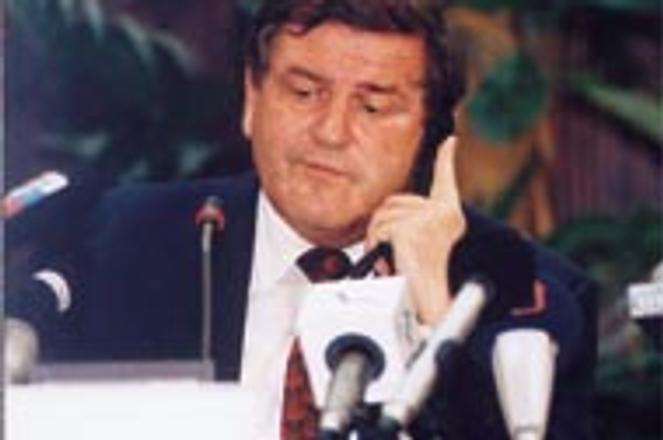The Slovak and Hungarian premiers, Vladimír Mečiar and Gyula Horn, swapped views while meeting in Györ on August 15. While Horn pressed for Slovak-Hungarians' rights, Mečiar asked Horn to protect Slovak minority rights in Hungary.Daniel Veselský
One month after the historic Madrid NATO summit, Slovak Premier Vladimír Mečiar again met with his Hungarian counterpart, Gyula Horn, and Polish President Aleksandr Kwasniewski. But this time it was different. Now that Hungary and Poland are in the NATO and European Union (EU) clubs and Slovakia has been left out, at least for now, both Horn and Kwasniewski clearly acted as if they now had the upper hand.
At their meeting in the northwest Hungarian town of Györ on August 15, Horn presented Mečiar with a memorandum of how the Hungarian government wants the fundamental bilateral treaty both leaders signed more than two years ago in Paris to be implemented.
"In these matters there has been no genuine step forward in the last three years, and it is now time that the commitments undertaken by the Slovak party should finally be implemented," Horn told a news conference after a private, three-hour discussion with the Slovak prime minister.
Budapest complained that Slovakia was dragging its feet on executing many of the treaty's provisions, and is especially angry over Slovak parliamentary leaders' delay in introducing a law to protect minority languages in Slovakia, a country with an estimated 600,000 strong Hungarian minority. For more than a year, governing coalition representatives have promised that the law would be passed.
Mečiar countered, saying that a bill on minority languages will be prepared, but that Hungary should have a similar law for the Slovak minority there. But Horn dismissed the request as unnecessary, saying that minority language rights are to be included in a general law on minorities to be passed by December.
The Hungarian plan included binding both countries' foreign ministers to fill the implementation committees by September 30 and binding the Slovak government to pass the minority language law by November 30.
Horn suggested that minority representatives should be nominated to both countries' committees for implementing minority rights. But his and Mečiar's opinions differed when it came to the point of who those representatives should be.
"It is totally normal for us that the nomination of Slovak minority representatives to the committee will be the Hungarian Slovaks' business," Horn said, suggesting the same rule be applied in Slovakia. But Mečiar flatly disagreed. "In the government committee there will be minorities' representatives, but they cannot be representatives of the political forces who oppose the government on every issue," Mečiar said, referring to 18 Slovak Hungarian deputies in the Slovak Parliament who would be popular choices for the committee.
Horn wrapped up the rather resultless summit (only three out of the plan's nine points were approved) with a shot. "If the plan of measures I put to Prime Minister Mečiar is not implemented, it will be rather difficult to develop bilateral relations," Horn said. "And if bilateral relations do not improve, the responsibility will lie with the Slovak party."
[NEED A REACTION HERE]
The Kwasniewski meeting
Horn's self-confidence, perhaps fuelled by the fact that he played host to the summit, was balanced by Kwasniewski's politeness during his August 20-21 visit to Slovakia, his first since he took office two years ago.
Without any burning political issue on the agenda, Kwasniewski focused mostly on economic relations. However, he took a paternal stance in comments on Slovakia's exclusion from NATO. "Poland will continue to support Slovakia's efforts to join trans-Atlantic and European structures," Kwasniewski told a news conference.
But he was quick to dispense some fatherly advice, pointing out that Slovakia must do its democratic homework first. "Slovakia itself must, however, show its desire to join NATO and the EU," he said. In an interview for the Pravda daily, Kwasniewski elaborated, "Poland cannot enter NATO on behalf of Slovakia, the Slovak nation, your cabinet or your Parliament. It is your internal problem that has to be solved in your country by yourself."
The EU integration process includes consultations by Brussels with all aspiring countries soliciting their opinions on the suitability for membership of other candidates from the region. Kwasniewski admitted that the three frontrunners in NATO and EU integration were assigned the task of evaluating the candidates from the central European region. "I didn't come to Slovakia in a role of a reviewer," he said shortly after his arrival. "In negotiations with these organizations, we will never turn our back on Slovakia," he reiterated the same day at a monthly meeting of business leaders.
However, Horn may view this differently, stating in Györ, "It is by no means immaterial what sort of opinion Hungary's representatives have on how human rights are implemented in the neighboring countries."


